1.
Now that my dad is gone, I find that almost all my memories of him are of him in motion: picking sweet corn so fast in the wet Wisconsin heat that sweat dripped off his nose; climbing nimbly on and off tractors to check on the machinery’s workings; marching in a protest against governmental involvement in agricultural pricing, shaking his finger in a petty official’s face.
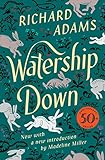 My first memory of my father as a reader was him telling me to hurry up; it was almost time to silflay. Being maybe eight or nine at the time, I had no idea what he was talking about until he explained that “silflay” meant “to eat.” Did he explain then that the word was used by rabbits, in Richard Adams’s hugely popular anthropomorphic novel Watership Down? I can’t remember, but I think not. I simply filed the word away as another synonym. No one in our household had time to read to me, and no one in my grade school offered any literary allusions. Our school librarian shuttled between several schools, making our library a mostly self-service. So when I finally read Watership Down in middle school, intrigued by Dad’s references, it was a revelation.
My first memory of my father as a reader was him telling me to hurry up; it was almost time to silflay. Being maybe eight or nine at the time, I had no idea what he was talking about until he explained that “silflay” meant “to eat.” Did he explain then that the word was used by rabbits, in Richard Adams’s hugely popular anthropomorphic novel Watership Down? I can’t remember, but I think not. I simply filed the word away as another synonym. No one in our household had time to read to me, and no one in my grade school offered any literary allusions. Our school librarian shuttled between several schools, making our library a mostly self-service. So when I finally read Watership Down in middle school, intrigued by Dad’s references, it was a revelation.
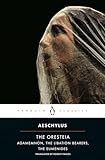 You have to love a book about bunnies that opens with a quote from Aeschylus’s tragedy Agamemnon. “The stench is like a breath from the tomb.” Goddamn. Compelled by his brother Fiver’s premonition that their warren is in grave danger, practical and action-oriented Hazel decides to strike out with Fiver and several of their friends to start a new warren. Completely caught up in the adventure and Hazel’s plans for his new home, I got lost in the book. I followed him across the English countryside. I followed him on daring raids on farms to add female rabbits to their company. Hazel was a natural leader, and I knew how his compatriots felt; I would have followed him anywhere.
You have to love a book about bunnies that opens with a quote from Aeschylus’s tragedy Agamemnon. “The stench is like a breath from the tomb.” Goddamn. Compelled by his brother Fiver’s premonition that their warren is in grave danger, practical and action-oriented Hazel decides to strike out with Fiver and several of their friends to start a new warren. Completely caught up in the adventure and Hazel’s plans for his new home, I got lost in the book. I followed him across the English countryside. I followed him on daring raids on farms to add female rabbits to their company. Hazel was a natural leader, and I knew how his compatriots felt; I would have followed him anywhere.
Reading Watership Down was a completely satisfying experience. But it was also a new chapter in my relationship with my father, who up until then I had loved a lot and feared just a bit but mainly just accepted as my father more so than as a person with his own interests. Knowing he loved this book enough to quote from it, to introduce its vocabulary into our vocabulary, made me look at him differently. My strict, Catholic, hard-working father loved a book in which rabbits talked and planned and had adventures. He loved books, in short, that I loved, too.
When my dad died, suddenly but not unexpectedly—a heart attack at age 83,—my sisters and I took turns sleeping at my mom’s house. That first night, of course, with dad’s heart giving out a few hours past suppertime, the EMTs and coroner working past midnight, no one could sleep. I took that first night and lay in the guest room in an adrenaline-fed waking dream state, uncomfortable on unfamiliar pillows. When I closed my eyes, I still saw my father on the kitchen floor, his familiar and work-scarred hands at his sides. More than a decade before I had seen my brother in nearly the same pose, after his accidental death by electrocution on our home farm. Both times I had only the sense that the people I knew, my older and worshipped brother and my dad whom I had helped dig potatoes only a week before, were completely and utterly gone. Their bodies were made strange to me. So I opened my eyes and worried about my mother instead, sad for what I knew would be her loneliness and uncertainty in a future without her husband of nearly 60 years. I also despaired at the thought of the next few days.
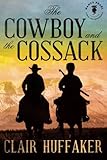 I’m told that some people find comfort in accepting condolences from family and friends, in attending a religious service for closure. I am not one of those people. My dad, on the other hand, found meaning in rituals. “You have to respect the ceremony, Sarah,” I can hear him saying. At some point in the endless afternoon, a very nice man whom I didn’t know pressed a small paperback book into my hands and said, “Romie lent me this book and said I had to read it. I did—it was wonderful—and I’ve meant to return it for so long.” He passed the book to me like a sacrament, and when I saw what book it was, Clair Huffaker’s 1973 pulp Western The Cowboy and the Cossack, that was how I received it. When I left the wake I took the book with me. I had originally purchased it for dad, so that seemed about right.
I’m told that some people find comfort in accepting condolences from family and friends, in attending a religious service for closure. I am not one of those people. My dad, on the other hand, found meaning in rituals. “You have to respect the ceremony, Sarah,” I can hear him saying. At some point in the endless afternoon, a very nice man whom I didn’t know pressed a small paperback book into my hands and said, “Romie lent me this book and said I had to read it. I did—it was wonderful—and I’ve meant to return it for so long.” He passed the book to me like a sacrament, and when I saw what book it was, Clair Huffaker’s 1973 pulp Western The Cowboy and the Cossack, that was how I received it. When I left the wake I took the book with me. I had originally purchased it for dad, so that seemed about right.
2.
The Cowboy and the Cossack is a thoroughly improbable Western, featuring a cattle drive across Siberia in the late 19th century and, uniting in common purpose, a group of hard-bitten American cowboys and harder-bitten Russian Cossacks. The cowboys and the cattle brave a sea voyage to Russia because the cattle have been purchased by the Cossacks’ home village, and the Cossacks show up to help escort the herd the thousands of miles across Siberia to their home. Along the way they must deal with both the Tsar’s Imperial Cossacks (the Tsar’s toadies, not to be confused with our independent Cossacks) and the vicious Tartar armies in the area, who commit atrocities seemingly at random and scare the shit out of our heroes, which is no small feat considering their hard-bitten natures. When I first read it, I devoured it in about two days and then thought, you know who would probably appreciate this book? My dad, that’s who.
 I already knew that he was not opposed to historical fiction. In high school, when he found me watching a video of the television movie Ivanhoe (the 1982 version, starring Anthony Andrews), based on the historical novel set in the Middle Ages by Sir Walter Scott, he’d offered his positive opinion about the lady Rebecca, the daughter of a merchant who offers refuge to the embattled knight Ivanhoe. I knew he would enjoy The Cowboy and the Cossack.
I already knew that he was not opposed to historical fiction. In high school, when he found me watching a video of the television movie Ivanhoe (the 1982 version, starring Anthony Andrews), based on the historical novel set in the Middle Ages by Sir Walter Scott, he’d offered his positive opinion about the lady Rebecca, the daughter of a merchant who offers refuge to the embattled knight Ivanhoe. I knew he would enjoy The Cowboy and the Cossack.
When he finally got around to reading the library copy I’d lent him, I got a phone call, to gush over it and discuss some of its finer points, the way a real reader often has to do with other real readers at the close of a world-altering book. He immediately passed it on to my brother Kevin (a hard-bitten cowboy-farmer type himself), and then I had to take it back to the library. I count the finding and giving of this book to my father as one of my proudest accomplishments. Thereafter Dad asked me to track down some paperback copies so that he could loan them out to other people, and it was one of those copies that came back to me at his wake. When I left the funeral home with my eyes swollen and my feet aching, I put the book in the trunk of my car and left it there, until, months later, finally ready to touch it again, I retrieved it and thought about re-reading it. When I opened it up, there inside the front cover, in his bold and outsized cursive, was written, “Roman Statz.” I touched my fingers to the name as though I might be able to touch the living hand that had written it.
3.
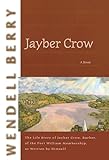 Giving my dad Huffaker’s Western was the greatest reading recommendation I scored with him (though Wendell Berry’s novel Jayber Crow, which I had gifted to him a few years previously, was a close second and had led him into a late love affair with that author’s many novels and essay collections). I was never quite able to replicate it again. An attempt to recapture reading lightning in a bottle with another of Huffaker’s novels failed, though he pronounced it an enjoyable enough read. Nothing failed as spectacularly, though, as my attempt to give him Ray Bradbury. I’d just finished my second or third reading of Bradbury’s novel Something Wicked This Way Comes, and I thought, you know, I bet Dad would eat this up with a spoon. So I passed along yet another library copy and waited to hear another rave.
Giving my dad Huffaker’s Western was the greatest reading recommendation I scored with him (though Wendell Berry’s novel Jayber Crow, which I had gifted to him a few years previously, was a close second and had led him into a late love affair with that author’s many novels and essay collections). I was never quite able to replicate it again. An attempt to recapture reading lightning in a bottle with another of Huffaker’s novels failed, though he pronounced it an enjoyable enough read. Nothing failed as spectacularly, though, as my attempt to give him Ray Bradbury. I’d just finished my second or third reading of Bradbury’s novel Something Wicked This Way Comes, and I thought, you know, I bet Dad would eat this up with a spoon. So I passed along yet another library copy and waited to hear another rave.
 I would be waiting for weeks. I would be waiting, in fact, until I finally had to ask him if he had read it because it was due back at the library. “Oh, you can take that book back,” he told me, dismissively. “That book is too weird for me!” I was taken aback. I tried to ask him a few more questions about what it was he didn’t like about the book. He’d read far “weirder,” in my opinion (Slaughterhouse-Five comes to mind) and enjoyed those. I asked my sister, another Bradbury fan, how it was that this reader I thought I knew so well had so thoroughly rejected one of my favorite novels. What wasn’t to like? The stunning autumn imagery? The perfectly unsettling descriptions of the malevolence underlying the carnival that arrives one dark October night in the hometown of the young protagonists Will and Jim? The truth of the book’s story, wherein everyone old longed to be a bit younger and everyone young longed to be just a bit older? We were stymied. Forever after, whenever I gave him a book, he would say, “It’s not like that weird book, is it?”
I would be waiting for weeks. I would be waiting, in fact, until I finally had to ask him if he had read it because it was due back at the library. “Oh, you can take that book back,” he told me, dismissively. “That book is too weird for me!” I was taken aback. I tried to ask him a few more questions about what it was he didn’t like about the book. He’d read far “weirder,” in my opinion (Slaughterhouse-Five comes to mind) and enjoyed those. I asked my sister, another Bradbury fan, how it was that this reader I thought I knew so well had so thoroughly rejected one of my favorite novels. What wasn’t to like? The stunning autumn imagery? The perfectly unsettling descriptions of the malevolence underlying the carnival that arrives one dark October night in the hometown of the young protagonists Will and Jim? The truth of the book’s story, wherein everyone old longed to be a bit younger and everyone young longed to be just a bit older? We were stymied. Forever after, whenever I gave him a book, he would say, “It’s not like that weird book, is it?”
What’s really amazing is not that I missed with Something Wicked, but that I ever hit at all. We were very different people. His self-discipline was legendary. Dad always pushed a little harder and thought a little smarter to raise just those few extra crops, make his dairy herd a bit better; I can’t hold a full-time job. He loved to talk to people; I love not to. I could go on.
 In spite of our differences, I did still hit—a lot. My father and I shared nonfiction by Michael Lewis and memoirs by Michael Perry (whose first memoir Population 485 was set in Perry’s hometown of New Auburn, Wisc., a small town my parents thereafter haunted until they found and met Perry’s parents, still living on their home farm). I took him books by some of his favorite politicos, Ron Paul among them, and took him books by political affairs authors I considered readable, like Andrew Bacevich. My sister informs me that Bacevich, an author noted on Wikipedia for his “Catholic conservatism” and his opposition to our wars in Iraq and Afghanistan, was a particularly big hit.
In spite of our differences, I did still hit—a lot. My father and I shared nonfiction by Michael Lewis and memoirs by Michael Perry (whose first memoir Population 485 was set in Perry’s hometown of New Auburn, Wisc., a small town my parents thereafter haunted until they found and met Perry’s parents, still living on their home farm). I took him books by some of his favorite politicos, Ron Paul among them, and took him books by political affairs authors I considered readable, like Andrew Bacevich. My sister informs me that Bacevich, an author noted on Wikipedia for his “Catholic conservatism” and his opposition to our wars in Iraq and Afghanistan, was a particularly big hit.
 For a while I would send letters to authors, telling them briefly about my parents and then asking them to sign and return the books I enclosed. One such book was Diane Schoemperlen’s novel Our Lady of the Lost and Found, in which the Virgin Mary visits an author, a woman who lives alone in present-day Canada, and stays for a week of vacation. The two talk about Mary’s and the author’s respective experiences, share home-cooked meals, and go on mundane shopping trips to the mall. I thought this choice another no-brainer, as my dad’s Catholicism and personal devotion to Mary the Mother of God were two of his defining personality traits. He often put fresh flowers in a vase by the statue of Mary in his bedroom. He credited Mary for interceding for him and helping him find a good wife.
For a while I would send letters to authors, telling them briefly about my parents and then asking them to sign and return the books I enclosed. One such book was Diane Schoemperlen’s novel Our Lady of the Lost and Found, in which the Virgin Mary visits an author, a woman who lives alone in present-day Canada, and stays for a week of vacation. The two talk about Mary’s and the author’s respective experiences, share home-cooked meals, and go on mundane shopping trips to the mall. I thought this choice another no-brainer, as my dad’s Catholicism and personal devotion to Mary the Mother of God were two of his defining personality traits. He often put fresh flowers in a vase by the statue of Mary in his bedroom. He credited Mary for interceding for him and helping him find a good wife.
He didn’t read the Schoemperlen right away, but I left it alone; I believe people have the right to read gift books in their own time (or not at all). Years later he told me he had read and enjoyed it, but he didn’t gush. And that was okay.
4.
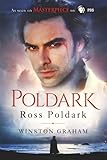 Sometime in the year before my father died, I was doing the dishes, and I thought, you know, my dad could die. It was a disquieting notion. And of course I’m no fool; I knew that my dad, like everyone’s dad, was going to die. But, if it makes any sense, it hadn’t really occurred to me before that moment. And I think that moment had something to do with Winston Graham’s novel Ross Poldark.
Sometime in the year before my father died, I was doing the dishes, and I thought, you know, my dad could die. It was a disquieting notion. And of course I’m no fool; I knew that my dad, like everyone’s dad, was going to die. But, if it makes any sense, it hadn’t really occurred to me before that moment. And I think that moment had something to do with Winston Graham’s novel Ross Poldark.
When I took Ross Poldark to my dad, I was going back to the historical fiction well. The book is set in 18th-century Cornwall, and its titular character—man’s man, ladies’ man, man about town—is back home after fighting on the losing side of the American War of Independence. His dad has died, his estate is in a mess, and his fiancée is now set to marry his cousin, all of which makes this pretty typical pulp historical fare. But then Graham does something a little unexpected. He gives us one of the all-time great heroines of fiction: dark-haired, dark-eyed, poor-miner’s-daughter Demelza.
I’ll be honest. I thought dad would enjoy Ross, primarily because Ross always makes the bold, independent decision rather than the prudent one, but the ace in the hole here was always Demelza. If Ivanhoe’s heroine Rebecca was strong-willed, Demelza was downright wild. Within the confines of her own circumstances as a young woman, and one mired in poverty and an abusive family at that, she takes her own steps to better her circumstances. Does she seduce Poldark because she loves him, because she recognizes him as a singular man, or because she can’t go back to her father’s house? A little of all three? Who knows? Who cares. I looked forward to many conversations with dad about Demelza.
But these conversations were never forthcoming. I gave Poldark to my dad in the spring, and that was perhaps unwise timing on my part. After beating lymphoma in his late 70s and enduring more than a year of severe back pain, dad had become more insistent than ever on working in the orchard, sweet corn, and garden. His work discipline seemed only to become more entrenched as he aged, and clearly something in him responded strongly to seeing new things popping out of the earth. Compared to that thrill, reading sometimes took a back seat during the summer and fall harvest months.
I have a work ethic, but it varies from my parents’ in its intensity and focus, and I apply mine to reading rather than gardening. This has led to conflict: I thought my parents were working too hard on their crops, and I didn’t want to feel indebted to them for food I would have preferred simply to buy. In the spring of 2015, I told my father, as he weeded in his raspberry patch, that I wouldn’t be taking any more produce from them. His response, though I know that he heard me, was simply to keep working. After he suffered his fatal heart attack in September of that same year, I would think back to that moment many times and cringe. Even though fiction seemed no longer to be on the list of priorities, he did eventually read Poldark and remarked upon it favorably to me. Part of the reason I had been so excited to give him the book was that the series it started eventually grew to 12 titles in all, and they were all great. But after listening to his mildly positive review, and after watching him plant and then dig potatoes as though his life depended on it, I knew he didn’t need the rest of the series. Shortly after that I had my unsettling thought at the kitchen sink, starting to try to prepare myself for a world without my father in it.
5.
The spring after he died, my sons and I were visiting my mom with the intention of helping her pick her strawberries. It started to rain, so I said to mom, “Why don’t I tidy up your bookshelves and make room for other books you’ve got just sitting around the house?” She demurred for a while but eventually agreed, and I set about emptying and dusting the living room shelves. I removed outdated nonfiction and mysteries mom was unlikely to read, moved some other books I thought she might like to lower shelves, and made enough room for new titles that had just been strewn about the house. I suggested we all look through the discards, save anything we wanted, and donate the rest to the library.
When I was done, I went to look at dad’s slightly more personal bedroom bookshelf. I wasn’t about to touch that one because it didn’t really need to be cleaned off right then; the living room shelves had yielded enough room for all the rogue books. Also, I’m a magical thinker like anyone else. If I leave those books there, perhaps someday he will come back and read them.
 That bookshelf doesn’t hold anything rare or even particularly sentimentally valued. Dad was not a book fetishist like me. On his shelves there is a row of James Michener novels from the time when he systematically plowed through all of them. There are some books on religion and a few more on politics, showing his conversion from pure Republicanism to an anti-war one who read Bacevich. There is Slaughterhouse-Five, and there is a paperback memoir titled Pig Boy’s Wicked Bird that I brought him back from some library conference and never really expected him to read (though he did, and liked it much more than I thought he would). There is a set of Time Life books about the history of the American West. These are brown-leatherette-bound volumes with gold lettering that I know dad paid too much for. He called to consult me on their purchase, when he and mom were visiting an antique store, and I knew the price was too high as soon as I heard “Time Life.” He asked me if he should buy them anyway. I didn’t know if he was seeking my professional opinion as a reader, a librarian, or a bookseller (I’ve worked as all three), but I told him they were almost certainly overpriced as physical books, but if he really wanted to read them and valued having them in a set, he should buy them. So there they now sat, and when I asked mom at lunch whether he had tried to bargain with the antique seller to buy them, she said she kind of thought he hadn’t. “He did read a lot of them, though,” she said.
That bookshelf doesn’t hold anything rare or even particularly sentimentally valued. Dad was not a book fetishist like me. On his shelves there is a row of James Michener novels from the time when he systematically plowed through all of them. There are some books on religion and a few more on politics, showing his conversion from pure Republicanism to an anti-war one who read Bacevich. There is Slaughterhouse-Five, and there is a paperback memoir titled Pig Boy’s Wicked Bird that I brought him back from some library conference and never really expected him to read (though he did, and liked it much more than I thought he would). There is a set of Time Life books about the history of the American West. These are brown-leatherette-bound volumes with gold lettering that I know dad paid too much for. He called to consult me on their purchase, when he and mom were visiting an antique store, and I knew the price was too high as soon as I heard “Time Life.” He asked me if he should buy them anyway. I didn’t know if he was seeking my professional opinion as a reader, a librarian, or a bookseller (I’ve worked as all three), but I told him they were almost certainly overpriced as physical books, but if he really wanted to read them and valued having them in a set, he should buy them. So there they now sat, and when I asked mom at lunch whether he had tried to bargain with the antique seller to buy them, she said she kind of thought he hadn’t. “He did read a lot of them, though,” she said.
Even before that day, I had slipped into the bedroom to consider his bookshelf and books several times. I looked at his books, and I thought about my father, who never really wanted to be a farmer, reading Watership Down, recognizing in Hazel the desire to be independent, but to do so within a community that he loved and helped form. I thought about him racing through The Cowboy and the Cossack, enjoying the unlikely friendship between the two title characters, and about him reading Our Lady of the Lost and Found, and his willingness to eavesdrop on that book’s conversations between two women. I looked at all the books on that shelf, and I thought about his deep love of learning and his clear expectation that all of his children, male and female alike, go to college; he never got to go to college himself, and his sisters, my aunts, never even got to go to high school.
When I flip through my memories of my father, I find very few of them are of him actually sitting, reading. He must have done so late at night, after the milking was done, and I was already asleep or out for the night. He was not perfect because no one is. But I know I was loved, and from the moment he explained the word silflay to me, I knew he respected me as a person and as a future reader. He showed me the worlds of words and stories, of possibilities and mutual respect. What a gift for a girl. What a gift for anyone.
Image Credit: Unsplash/Polina Rytova.










